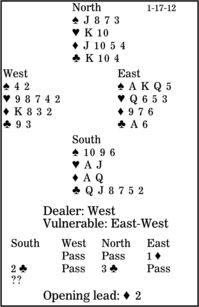Bridge column, January 17: Computer programs make many mistakes

Here is one example -- I will allow the software to remain anonymous.
Look at the South hand. After two passes, East opens one diamond, South overcalls two clubs (would you?), West passes, North raises to three clubs, and East passes. What should South do now?
Note that the distribution of the East hand, exactly 4-4-3-2, is the only one with which you open one diamond holding exactly three cards in the suit. However, especially in the third position, many experts would open one spade, willing, if necessary, to call the hand 5-4 in the majors. If partner ends up on lead, would you rather he choose a diamond or a spade?
There is a strong case for South's overcalling one no-trump, not two clubs. But given that he has bid clubs, when partner raises, he should take a shot at three no-trump. (The computer program bid four clubs, which is neither one thing nor another.)
Yes, three no-trump can be defeated by any opening lead but a diamond. Given the auction, though, what is West likely to select? Right -- a diamond, partner's bid suit. Then South drives out the club ace and has nine tricks.
Unless you are sure it is hopeless, go for three no-trump, not five of a minor. Even if you might fail, the defenders will often ride to your rescue.
** ** **
COPYRIGHT 2012, UNITED FEATURE SYNDICATE
DISTRIBUTED BY UNIVERSAL UCLICK FOR UFS

